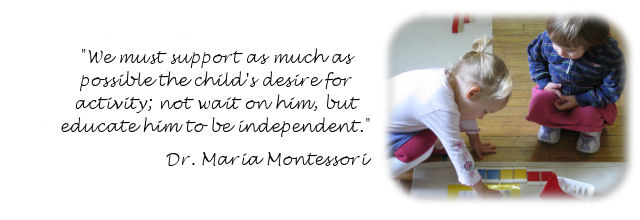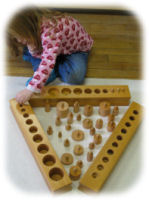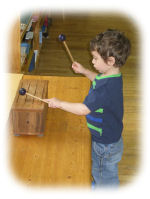
Curriculum
 Practical Life:
Practical Life:
The exercises of Practical Life reflect the activities that the child sees in his everyday life, such as pouring, polishing and plant care. Although the exercises seem simple, each exercise helps to develop fine and gross motor skills, independence, concentration, logical thinking and confidence.
Sensorial:
 Dr. Montessori referred to the young child as a 'sensorial explorer' because they experience the world through all of their senses. She felt that this was an opportune time to provide them with special materials designed to isolate one quality such as size, sound, colour, weight, shape, texture or taste. Children learn to compare, order and classify the impressions they have absorbed.
Dr. Montessori referred to the young child as a 'sensorial explorer' because they experience the world through all of their senses. She felt that this was an opportune time to provide them with special materials designed to isolate one quality such as size, sound, colour, weight, shape, texture or taste. Children learn to compare, order and classify the impressions they have absorbed.
Mathematics:
 The child is introduced to the language of numbers with concrete materials. This work is followed by the introduction of the symbols. Starting with the numbers to ten, the child is led through a very logical sequence of activities that will form the basis for all the rest of the work that the child will do in math. These exercises will provide a solid understanding of mathematical concepts such as addition and subtraction.
The child is introduced to the language of numbers with concrete materials. This work is followed by the introduction of the symbols. Starting with the numbers to ten, the child is led through a very logical sequence of activities that will form the basis for all the rest of the work that the child will do in math. These exercises will provide a solid understanding of mathematical concepts such as addition and subtraction.
Language:
 The Language program is phonetically based. The child is introduced to the alphabet through the use of Sand Paper Letters. It is with these letters that the child sees, feels and hears the sounds that make up words. The child then begins to form phonetic words with a movable alphabet. The composition of simple words follows this work. The classroom provides many opportunities to enhance and enrich the child's vocabulary and their appreciation for language.
The Language program is phonetically based. The child is introduced to the alphabet through the use of Sand Paper Letters. It is with these letters that the child sees, feels and hears the sounds that make up words. The child then begins to form phonetic words with a movable alphabet. The composition of simple words follows this work. The classroom provides many opportunities to enhance and enrich the child's vocabulary and their appreciation for language.
Culture:
 The child's appreciation for the arts and music and their understanding of botany, zoology, history and other cultures are fostered in the enriched cultural area. The children use maps, books, pictures and nature studies to further their understanding of the world around them.
The child's appreciation for the arts and music and their understanding of botany, zoology, history and other cultures are fostered in the enriched cultural area. The children use maps, books, pictures and nature studies to further their understanding of the world around them.
Music and art activities are offered to the chilren every day in their individual work and at circle time.


